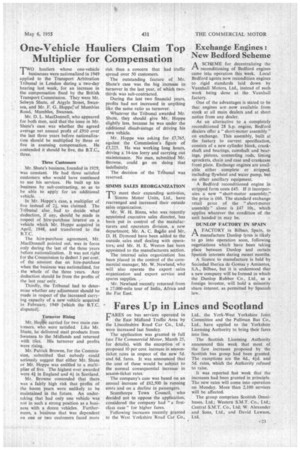One-Vehicle Hauliers Claim Top Multiplier for Compensation
Page 73

If you've noticed an error in this article please click here to report it so we can fix it.
TWO hauliers whose one-vehicle businesses were nationalized in 1949 applied to the Transport Arbitration Tribunal in London during a two-day hearing last week, for an increase in the compensation fixed by the British Transport Commission. They were Mr. Selwyn Shute, of Argyle Street, Swansea, and Mr. F. G. Hoppe; of Mumbles Road, Mumbles, Swansea.
Mr. D. L MacDonnell, who appeared for both men, said that the issue in Mr. Shute's case was whether the agreed average net annual profit of £910 over the last three years before nationalization should be multiplied by three or five in assessing compensation. He contended it should be five, the B.T.C., three.
Three Customers
Mr. Shute's business, founded in 1929, was constant. He had three satisfied customers who would have continued to use his services. He built up his business by sub-contracting, SO as to be able to apply for an additional vehicle.
In Mr. Hoppe's case, a multiplier of five instead of 21, was claimed. The Tribunal also had to decide what deduction, if any, should be made in respect of hire-purchase interest on a vehicle which Mr. Hoppe acquired in April, 1948, and transferred to the B.T.C.
The hire-purchase agreement, Mr. MacDonnell pointed out, was in force only during the last of the three years before nationalization. It was not right for the Commission to deduct 3 per cent. of the amount due on hire-purchase when the business was nationalized, for the whole of the three years. Any deduction should be from the profits of the last year only.
Thirdly, the Tribunal had to determine whether any adjustment should be made in respect of the increased carrying capacity of a new vehicle acquired in February, 1949 [which the B.T.C. disputed].
Turnover Rising Mr. Hope carried for two main customers, who were satisfied. Like Mr. Shute, he delivered steel products from Swansea to the Midlands and returned with tiles. His turnover and profits were rising.
Mr. Patrick Browne, for the Commission, submitted that nobody could seriously suggest that either Mr. Shute or Mr. Hoppe was entitled to a multiplier of five. The highest ever awarded were 41 in England and 4/ in Scotland.
Mr. Browne contended that there was a fairly high risk that profits of the boom years were unlikely to be maintained in the future. An undertaking that had only one vehicle was not in such a strong position as a business with a dozen vehicles. Furthermore, a business that was dependent on one or two customers faced more risk than a concern that had traffic spread over 50 customers.
The outstanding feature of Mr. Shute's case was the big increase in turnover in the last year, of which twothirds was sub-contracted.
During the last two financial years, profits had not increased in anything like the same ratio as turnover.
Whatever the Tribunal awarded Mr. Shute, they should give Mr. Hoppe slightly less, because he was under the additional disadvantage of driving his own vehicle, Mr. Hoppe was asking for £7,765, against the Commission's figure of £3,225. He was working long hours, driving a 14-ton lorry and carrying out maintenance. No man, submitted Mr. Browne, could go on doing that indefinitely.
The decision of the Tribunal was reserved.
SIMMS SALES REORGANIZATION
TO meet their expanding activities, Simms Motor Units, Ltd., have rearranged and increased their outside sales organization.
Mr. W. H. Sinus, who was recently appointed executive sales director, has been put in control of the manufacturers and operators division, a new department; Mr. A, C. Baldie and Mr. D. H. Dymond have been added to the outside sales staff dealing with operators and and Mr. H. E. Weston has been appointed to the manufacturers section.
The internal sales organization has been placed in the control of the commercial manager, Mr. W. Newland, who will also operate the export sales organization and export service and spares supplies.
Mr. Newland recently returned from a 27,000-mile tour of India, Africa and the Far East.




















































































































































































































































